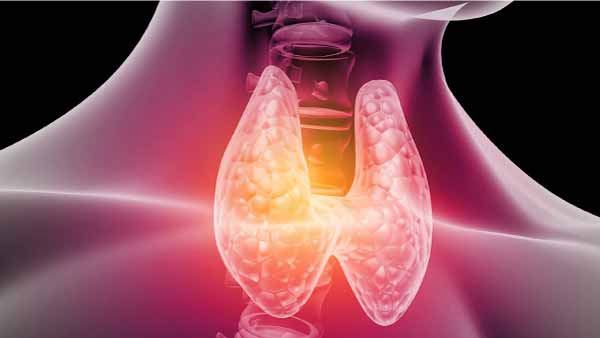Hypothyroidism is a medical condition in which the thyroid gland produces insufficient levels of thyroid hormones, which can lead to a variety of symptoms and health problems. The thyroid gland is a butterfly-shaped organ that is located in the front of the neck and is responsible for producing and releasing thyroid hormones into the bloodstream.
Thyroid hormones are essential for proper functioning of the body, as they help regulate metabolism, body temperature, heart rate, growth, and development. When the thyroid gland does not produce enough thyroid hormones, a variety of symptoms can arise, such as fatigue, weight gain, cold intolerance, constipation, dry skin, hair loss, depression, and decreased heart rate.
Hypothyroidism can be caused by a variety of factors, such as autoimmune diseases, thyroid surgery, radiation to the neck, viral infections, and certain medications. Treatment of hypothyroidism usually involves administering synthetic thyroid hormone to replace hormones that the thyroid gland cannot produce in sufficient quantities.
Aetiology
The etiology of hypothyroidism may vary depending on the type of hypothyroidism present. Below are the main causes of each type:
Primary hypothyroidism: it is due to a problem in the thyroid gland itself that prevents its proper functioning. The most common causes are:
Autoimmune disease: such as Hashimoto’s thyroiditis, in which the body’s immune system attacks the thyroid gland.
Radiation therapy treatment: Radiation to the neck to treat certain types of cancer can damage the thyroid gland.
Thyroid surgery: If the thyroid is completely removed or parts of it removed, there may be a significant reduction in thyroid hormone production.
Secondary hypothyroidism: In this type, the thyroid gland is normal, but does not receive adequate stimulation to produce enough thyroid hormones. The most common causes are:
Pituitary diseases: such as a tumor in the pituitary gland or head trauma.
Hypothalamic disorders: such as Cushing’s disease or hypopituitarism.
Congenital hypothyroidism: Occurs in babies born without a thyroid gland or with a thyroid gland that is not working properly. The causes can be genetic or due to environmental factors.
Subclinical hypothyroidism: This is a mild form of hypothyroidism in which thyroid hormone levels are low, but symptoms are not obvious. The causes may be similar to those of primary hypothyroidism.
It is important to note that certain medications, such as lithium and some antithyroids, can cause hypothyroidism as a side effect.
Clinical manifestations
The clinical manifestations of hypothyroidism can vary from person to person, depending on the severity and duration of the condition, as well as age and other health factors. Some of the most common clinical manifestations of hypothyroidism are:
Fatigue and weakness: Hypothyroidism can cause a constant feeling of tiredness and weakness, even after a good night’s sleep.
Weight gain: Due to a decrease in basal metabolism, people with hypothyroidism may have difficulty losing weight or even gaining weight without apparent cause.
Sensitivity to cold: Hypothyroidism can decrease the body’s ability to regulate temperature, which can make the person feel cold easily.
Constipation: Decreased bowel activity can cause constipation and abdominal pain.
Dry skin and hair loss: Hypothyroidism can affect skin and hair, making them drier and brittle.
Difficulty concentrating: Hypothyroidism can affect cognitive ability, making the person feel sluggish or unable to concentrate.
Depression and mood swings: Hypothyroidism can affect a person’s mood and mental health, causing depression and mood swings.
Decreased heart rate: Hypothyroidism can slow the heart rate, which can cause fatigue and dizziness.
It is important to note that some of these symptoms may also be present in other medical conditions, so it is important to consult a doctor if any of these symptoms are experienced.
Diagnosis
The diagnosis of hypothyroidism is based on a combination of factors, such as the patient’s symptoms, the results of laboratory tests, and clinical examination. The following are the main methods for diagnosing hypothyroidism:
History and physical examination: The doctor may ask about the patient’s symptoms, medical history, and perform a physical exam to evaluate the thyroid, as well as to look for other signs of hypothyroidism, such as dry skin and hair loss.
Blood tests: Blood tests may be done to measure levels of thyroid-stimulating hormone (TSH) and thyroid hormones (T4 and T3). In primary hypothyroidism, TSH levels are high and T4 and T3 levels are low. In secondary hypothyroidism, TSH levels are low and T4 and T3 levels are low.
Imaging tests: Imaging tests, such as ultrasound or CT scan, may be done to evaluate the thyroid and look for any abnormalities, such as nodules or cysts.
Specialized thyroid function tests: Specialized tests may be done to evaluate the thyroid’s ability to produce and release thyroid hormones. These tests may include the thyrotropin suppression test and the thyrotropin stimulation test.
It’s important to note that symptoms of hypothyroidism can be vague and nonspecific, and that thyroid hormone levels can fluctuate over time, which can make diagnosis difficult. By
For this reason, the diagnosis of hypothyroidism should be made by a healthcare professional trained in the management of thyroid disorders. If hypothyroidism is suspected, it is important to seek medical attention to get an accurate diagnosis and receive appropriate treatment.
Differential diagnosis
The differential diagnosis of hypothyroidism includes other conditions that can cause similar symptoms, such as:
Depression: Depression can cause symptoms such as fatigue, difficulty concentrating, and mood swings, which may also be present in hypothyroidism.
Chronic fatigue syndrome: Chronic fatigue syndrome is a condition characterized by extreme fatigue, which may also be present in hypothyroidism.
Anemia: Anemia can cause fatigue, weakness, and feeling cold, which may also be present in hypothyroidism.
Fibromyalgia: Fibromyalgia is a condition characterized by muscle pain and fatigue, which may also be present in hypothyroidism.
Irritable bowel syndrome: Irritable bowel syndrome is a condition that causes abdominal pain, bloating, and constipation, which may also be present in hypothyroidism.
Menopause: Menopause can cause symptoms similar to hypothyroidism, such as sensitivity to cold and mood swings.
It is important to note that some of these disorders may coexist with hypothyroidism, and that a patient may have more than one condition that causes similar symptoms. For this reason, it is important to consult a healthcare professional to get an accurate diagnosis and receive proper treatment.
Treatment
Treatment of hypothyroidism usually involves the administration of synthetic thyroid hormones to replace the hormone deficiency and restore normal thyroid function. This is based on the underlying cause of hypothyroidism and the severity of symptoms. Treatment for hypothyroidism includes:
Synthetic thyroid hormone: The main treatment for HT is daily administration of synthetic thyroid hormone, such as levothyroxine (T4). The dose is adjusted according to age, weight, severity of HT and individual response to treatment. Patients should take medication daily, preferably on an empty stomach, and should not discontinue treatment without consulting their doctor.
Follow-up and adjustment of dose: It is important to follow up regularly with the doctor to evaluate the levels of thyroid hormones in the blood and adjust the dose of medication as needed.
Treatment of the underlying cause: If HT is caused by an autoimmune disease, such as Hashimoto’s thyroiditis, the underlying cause can be treated to help prevent the progression of HT .
Lifestyle changes: Patients with HT may benefit from lifestyle changes, such as a healthy diet and regular exercise, to help manage symptoms and improve quality of life.
In general, treatment for HT is very effective and most patients can lead a normal life with proper medication and regular follow-up with their doctor.
Recent research
There is several recent research in the field of HT that might be of interest. Some of these investigations include:
Relationship between subclinical HT and cognitive dysfunction: There is evidence to suggest that subclinical HT, a mild form of HT, may be associated with an increased incidence of cognitive dysfunction. A recent study found that patients with subclinical HT had an increased risk of developing dementia compared to patients with normal thyroid function.
Effects of HT on the cardiovascular system: Several studies have investigated the relationship between HT and cardiovascular health. A recent literature review found that HT is associated with an increased risk of cardiovascular disease, including heart disease and stroke.
New therapies: Although treatment with synthetic thyroid hormones is highly effective for HT, there is also ongoing research on new therapies that could be helpful for patients who do not respond well to standard therapy. For example, a recent study investigated the efficacy of stem cell therapy for HT and found that it may be a promising option for treatment in the future.
Overall, research on continues to advance and there are many exciting areas of ongoing research.


